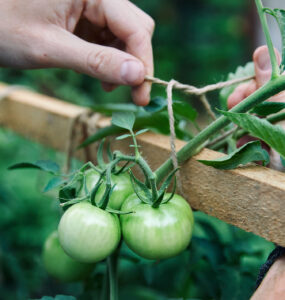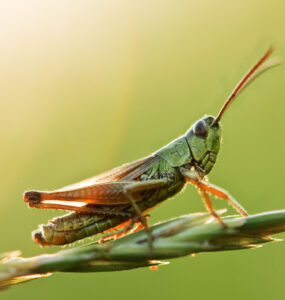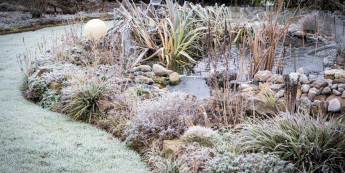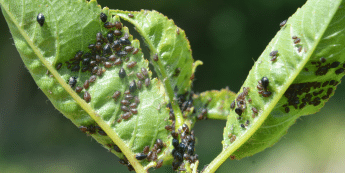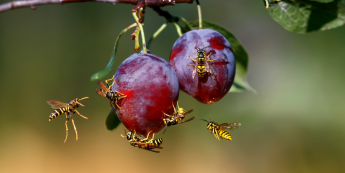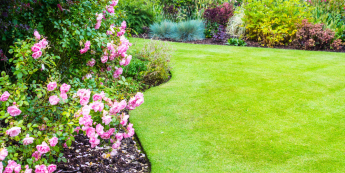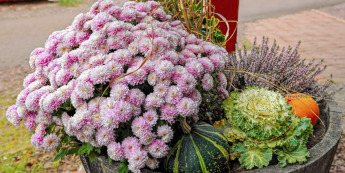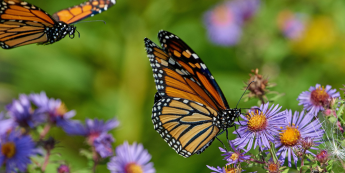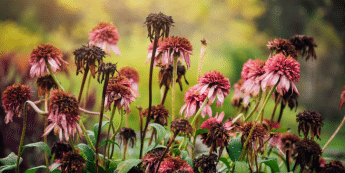Fruit Flies
by Rob Sproule
We’ve all been there. You’re enjoying a ripe bunch of bananas and fresh summer peaches one day and they’re buzzing with little flies the next. Fruit flies (Drosophila melanogaster) are magicians, appearing seemingly out of nowhere to transform your fruit bowl from delightful to disgusting with the flick of a wrist.
Although we rarely notice them in the garden or on plants, I’m including fruit flies for their sheer ubiquity, ick-factor, and surprising ease of control. We’ll never be rid of them, but at least we can learn how to get rid of them.
Where Do They Come From
Fruit flies appear so suddenly, and so alarmingly out of nowhere, that it’s easy to believe they reproduce via spontaneous generation. The fact is that they have an exceptional sense of smell, and can sniff out ripe fruit from a long way away. When fruit gets overripe, and the smell intensifies, it’s a fruit fly dinner bell.
Having fruit flies doesn’t mean your house is filthy. They are small enough to fit through screens or door cracks. You might even have brought some eggs home with you on that banana bunch. Don’t stress about where they came from, and don’t waste energy trying to ensure they don’t come back, because they will. Focus on simple ways to get rid of them.
Controlling Them
Also called Vinegar or Wine flies, fruit flies’ rapid speed life cycles enable their populations to explode as long as they have food. They can go from egg to adult to egg again in a week and can lay 500 eggs at a time. When you see one, the clock is ticking!
The good news is they’ll always be attached to overripe fruit, so as soon as you see them find the fruit in question and dispose of it. Wash the bowl well to clear out any remaining eggs. Check all remaining fruit and dispose of anything with cuts or open/ oozing wounds.
They can breed in dirty sponges, so if that thing in your sink doesn’t pass the smell test, off it goes. Empty your indoor compost bin, as well. Put it all in a sealed bag and throw it in the outside bin.
After that, wipe down your kitchen garbage (interior, too) with vinegar. They need a surprisingly small smear of fruity goo to reproduce. Wash your dishes and check for old wine glasses around the house. They love the leftover wine in the bottom!
They’re sneaky and like laying eggs in unexpected places. Develop a habit of keeping the stopper in your kitchen sink, as the drain is one of their favourite and frustrating spots.
Once that infestation is cleared, there are steps you can take to prevent another one. Fruit flies hate basil, so keep a pot of it next to your fruit bowl to deter them (and you get fresh basil as a bonus).
Fruit fly traps are easy to make and surprisingly effective. They’re so easy to make that I wouldn’t bother buying one. Grab a mason jar and drop in some ripe banana and a splash of apple cider vinegar. Snug some plastic wrap around the top and poke 1 or 2 very small holes. The smell will lure them in and they’ll never come out.
You can also use a wine bottle with an inch left at the bottom (though I’d rather drink it). Leave the cork out and create a paper funnel at the top for as small an entry as possible.
Disgusting Little Heroes
Even as I try to get rid of them, I tip my hat to the lowly fruit fly. Over 100 years ago, Thomas Hunt Morgan began incorporating fruit flies into his explorations into early genetics. Their quick life cycle and adaptability, combined with their surprisingly genetic similarity with humans (humbling, I know) make them the ideal test subjects. Fruit flies helped Morgan win the 1933 Nobel Prize for his groundbreaking work in genetic inheritance.
Since Morgan, fruit flies have enabled researchers to do everything from chart our genetic map to explore the relationship of genetics with cancer. Today, thousands of labs across North America are using fruit flies to understand the genome, cure disease, and improve quality of life for millions. The next time you shoo them off your bananas, give them a nod!



